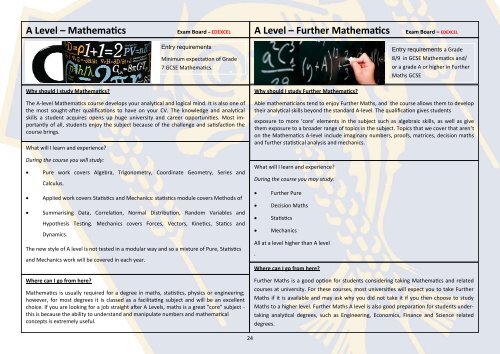Prospectus 2020-2022
The sixth form prospectus for students looking to join an Ofsted 'Outstanding' provision with a national reputation for academic success (top 17% for progress) sporting success (nationally recognised for rugby and cross-country) and cultural excellence through music and art.
The sixth form prospectus for students looking to join an Ofsted 'Outstanding' provision with a national reputation for academic success (top 17% for progress) sporting success (nationally recognised for rugby and cross-country) and cultural excellence through music and art.
You also want an ePaper? Increase the reach of your titles
YUMPU automatically turns print PDFs into web optimized ePapers that Google loves.
A Level – Mathematics<br />
Exam Board – EDEXCEL<br />
A Level – Further Mathematics<br />
Exam Board – EDEXCEL<br />
Entry requirements<br />
Entry requirements a Grade<br />
Minimum expectation of Grade<br />
8/9 in GCSE Mathematics and/<br />
7 GCSE Mathematics.<br />
or a grade A or higher in Further<br />
Maths GCSE<br />
Why should I study Mathematics?<br />
Why should I study Further Mathematics?<br />
The A-level Mathematics course develops your analytical and logical mind. It is also one of<br />
the most sought-after qualifications to have on your CV. The knowledge and analytical<br />
skills a student acquires opens up huge university and career opportunities. Most importantly<br />
of all, students enjoy the subject because of the challenge and satisfaction the<br />
course brings.<br />
What will I learn and experience?<br />
During the course you will study:<br />
<br />
<br />
<br />
Pure work covers Algebra, Trigonometry, Coordinate Geometry, Series and<br />
Calculus.<br />
Applied work covers Statistics and Mechanics: statistics module covers Methods of<br />
Summarising Data, Correlation, Normal Distribution, Random Variables and<br />
Hypothesis Testing. Mechanics covers Forces, Vectors, Kinetics, Statics and<br />
Dynamics.<br />
The new style of A level is not tested in a modular way and so a mixture of Pure, Statistics<br />
and Mechanics work will be covered in each year.<br />
Where can I go from here?<br />
Mathematics is usually required for a degree in maths, statistics, physics or engineering;<br />
however, for most degrees it is classed as a facilitating subject and will be an excellent<br />
choice. If you are looking for a job straight after A Levels, maths is a great "core" subject -<br />
this is because the ability to understand and manipulate numbers and mathematical<br />
concepts is extremely useful.<br />
Able mathematicians tend to enjoy Further Maths, and the course allows them to develop<br />
their analytical skills beyond the standard A-level. The qualification gives students<br />
exposure to more ‘core’ elements in the subject such as algebraic skills, as well as give<br />
them exposure to a broader range of topics in the subject. Topics that we cover that aren’t<br />
on the Mathematics A-level include imaginary numbers, proofs, matrices, decision maths<br />
and further statistical analysis and mechanics.<br />
What will I learn and experience?<br />
During the course you may study:<br />
<br />
<br />
<br />
<br />
Further Pure<br />
Decision Maths<br />
Statistics<br />
Mechanics<br />
All at a level higher than A level<br />
.<br />
Where can I go from here?<br />
Further Maths is a good option for students considering taking Mathematics and related<br />
courses at university. For these courses, most universities will expect you to take Further<br />
Maths if it is available and may ask why you did not take it if you then choose to study<br />
Maths to a higher level. Further Maths A level is also good preparation for students undertaking<br />
analytical degrees, such as Engineering, Economics, Finance and Science related<br />
degrees.<br />
24
















